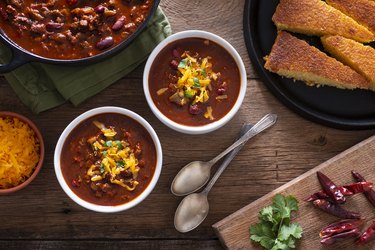
Given the popularity of spicy chips, condiments and even beverages, it's no surprise there are plenty of hot food fans out there.
Unfortunately for some, spice can bite back and cause stomach pain and discomfort, particularly if you already have a gastrointestinal disorder. Learn why spicy snacks and meals may be giving you grief and what you can do to manage your symptoms.
Video of the Day
Video of the Day
1. Capsaicin
The burn that comes from most spicy foods can be traced back to capsaicin, a chemical naturally found in chili peppers, according to University of Michigan Health. When capsaicin comes in contact with your stomach lining, it latches onto pain receptors, which alert the brain to the sensation of burning or pain.
In some cases, spicy food and capsaicin can be a big cause of stomach upset, according to Bonnie Taub-Dix, RD, registered dietitian, creator of BetterThanDieting.com and author of Read It Before You Eat It: Taking You from Label to Table.
Too much spice can even cause other conditions, like ulcers, acid reflux and IBS, all of which may be the source of your stomach pain.
2. Gastritis and Ulcers
In some cases, spicy foods can exacerbate conditions like gastritis and stomach ulcers, according to Johns Hopkins Medicine. Generally, your stomach lining is pretty strong, but eating too many spicy foods can cause damage and inflammation, also known as gastritis, which may worsen stomach pain.
Although spicy foods don't necessarily cause stomach ulcers, they can make symptoms, like stomach irritation, feel worse, especially if you're also experiencing gastrointestinal distress (more on that below), Taub-Dix says.
However, in some cases, the capsaicin in spicy foods may even help improve stomach ulcers, according to University of Chicago Medicine. Capsaicin has been shown to have some anti-inflammatory properties, which can relieve pain.
Bottom line: It's kind of a case-by-case basis when it comes to conditions like gastritis and stomach ulcers. Some people may feel more discomfort after eating spicy foods, while others may not have the same experience.
3. Acid Reflux
In some people, spicy foods may trigger or worsen symptoms of acid reflux, according to a July 2017 study in the Journal of Neurogastroenterology and Motility. Reflux occurs when the acidic stomach contents flow back into the esophagus, causing upper gastrointestinal pain and heartburn symptoms.
However, high-fat, large or late-night meals are more common triggers, according to the Mayo Clinic. There's no hard-and-fast rule when it comes to foods that trigger acid reflux, but if you tend to notice more reflux and stomach discomfort after a spicy meal, it's best to avoid those foods.
4. Irritable Bowel Syndrome
The capsaicin from chili peppers can also worsen uncomfortable symptoms associated with irritable bowel syndrome (IBS), Taub-Dix says. Often, IBS is accompanied by gastrointestinal distress and stomach pain, which may be another reason spicy foods are giving you grief.
4 Ways to Manage Stomach Pain From Spicy Food
There are a few simple remedies for an upset stomach from spicy food:
1. Avoid the Foods Causing You Pain
It may seem obvious, but simply avoiding the foods that cause you stomach pain is a good place to start, Taub-Dix says. Consider keeping a food journal of the foods you eat each day and jot down how you feel an hour or two after your meal. If you notice discomfort after eating hot chips or spicy peppers, you may want to take these out of your usual diet.
2. Pair Spicy Foods Strategically
Sometimes, sipping some water isn't enough to help minimize spice-induced stomach pain. That's why Taub-Dix recommends pairing spicier meals with something fatty and creamy (think: cream cheese or ice cream). Creamy foods can help counteract the effect of spicy food, giving you some pain relief.
3. Try Over-the-Counter Medicine
If spicy food causes discomfort, taking over-the-counter medications that neutralize your stomach acid (like Pepcid or Tums) may help relieve your symptoms, according to the Mayo Clinic.
4. See a Professional
If your stomach pain persists even after you've taken precautionary measures, it's best to consult a medical professional as soon as possible. They can help you find the best treatment plan and diet for your body.
- National Institute of Diabetes and Digestive and Kidney Diseases: What I Need to Know About Peptic Ulcers
- National Institute of Diabetes and Digestive and Kidney Diseases: Gastritis
- Merck Manual: Gastritis
- Merck Manual: Gastroesophageal Reflux Disease (GERD)
- Journal of Gastroenterology: Evidence-Based Clinical Practice Guidelines for Gastroesophageal Reflux Disease 2015
- National Institute of Diabetes and Digestive and Kidney Disorders: Irritable Bowel Syndrome
- Journal of Neurogastroenterology and Motility: Are Rice and Spicy Diet Good for Functional Gastrointestinal Disorders?
- Critical Reviews in Food Science and Nutrition: Capsaicin and Gastric Ulcers
- World Journal of Gastroenterology: Consumption of Spicy Foods and the Prevalence of Irritable Bowel Syndrome
- Digestive Diseases and Sciences: Effect of Red Pepper on Symptoms of Irritable Bowel Syndrome: Preliminary Study.
- The Journal of Alternative and Complementary Medicine:Turmeric Extract May Improve Irritable Bowel Syndrome Symptomology in Otherwise Healthy Adults: A Pilot Study
Is this an emergency? If you are experiencing serious medical symptoms, please see the National Library of Medicine’s list of signs you need emergency medical attention or call 911.